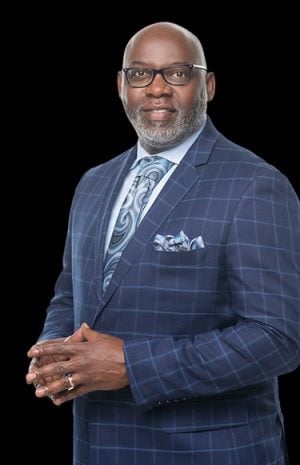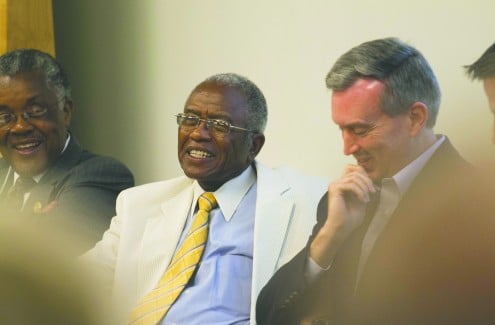Within the courtroom and within the pulpit, Andrew Hairston “tells issues as he sees them with out apologizing for the information,” fellow minister Calvin H. Bowers as soon as informed The Christian Chronicle.
Hairston was an acclaimed orator who preached for church buildings across the globe. He was a fiery legal professional who defended civil rights chief Martin Luther King Jr. and prosecuted Hustler journal writer Larry Flynt. And he was Atlanta’s first Black chief Justice of the Peace decide.
Andrew Hairston preaches on the Simpson Road Church of Christ in 2012. Hairston retired in August 2017 after practically 56 years because the congregation’s minister.
The 92-year-old minister died peacefully Tuesday morning, Jan. 14, somewhat greater than 63 years after he preached his first sermon for the Simpson Road Church of Christ in Atlanta. The North Carolina native moved to Georgia to minister for the predominantly Black congregation amid rising racial tensions and a burgeoning civil rights motion.
Hairston grew to become part of that motion. In the summertime of tumultuous 1968, he was amongst 40-plus outstanding Black and White ministers who gathered in a resort close to the Atlanta airport to debate methods to enhance race relations in Church buildings of Christ. The 2-day assembly occurred lower than three months after King’s assassination.
Associated: Fifty years after historic assembly, race nonetheless divides Church buildings of Christ
Hairston stored championing the causes of equality and justice throughout greater than a half-century as pulpit minister for the Simpson Road church.

Marcus T. Watkins
“Dr. Hairston was not solely a faithful minister but in addition a non secular and social icon whose affect reached far past our congregation,” stated Marcus T. Watkins, senior minister for Simpson Road, the place Hairston continued to function minister emeritus. “His unwavering religion, compassion and dedication to serving others have left an indelible mark on our church, the group and the lives he touched.”
Born close to Winston-Salem, N.C., the thirteenth of 15 kids, Hairston misplaced his father, a tenant farmer, at age 6. His mom cleaned houses throughout the day to help the household. After highschool, Hairston took a job driving an ice cream truck. A sister dwelling in Detroit inspired him to attend traditionally Black Southwestern Christian School in Terrell, Texas, and persuaded her Sunday faculty class to supply a $50 scholarship.
With most faculties and universities in Church buildings of Christ refusing to confess Black college students, Hairston grew to become a part of a pioneering technology at Southwestern, which opened its Terrell, Texas, campus in 1950. After finishing a two-year diploma, Hairston stayed for a bachelor’s in Bible, turning into one in all Southwestern’s first four-year graduates.

Jeanne and Andrew Hairston.
Hairston accepted an interim minister place in Fort Price, the place he met Jeanne. They have been married for greater than 70 years till Jeanne’s demise in 2022. Hairston earned two further bachelor’s levels earlier than enrolling at Brite Divinity College at Texas Christian College. He continued to evangelise in Fort Price till studying a couple of emptiness at Simpson Road.
Hairston and his household moved to Atlanta in 1961 — to evangelise for the church and support within the wrestle for civil rights, he informed the Chronicle in a 2012 interview because the church celebrated his fiftieth 12 months behind the pulpit.
Associated: Fifty years, one pulpit
Hairston recalled Atlanta conferences the place he sat throughout the desk from King. Hairston was a pacesetter in Operation Breadbasket, a program begun in 1962 by King and the Southern Christian Management Convention that inspired companies to undertake truthful hiring practices. Hairston was one of many operation’s “name males,” or native chairmen.
“I by no means did a variety of preaching on civil rights as such,” Hairston stated. “I’d take care of the topic, and take care of righteousness, and get my folks concerned within the motion.”
He noticed that pulpits of the time — each Black and White — prevented advocacy of the motion.
“It’s type of a Church of Christ ethos — that that’s past, that’s not what we’re right here for,” Hairston stated. “We’re right here to baptize and save folks.”
When Hairston enrolled in legislation faculty, he had no intention of practising. A working data of authorized issues would make him a greater minister, he reasoned.
However after passing the bar, he grew to become assistant solicitor basic within the state courtroom of Fulton County. Assigned to prosecute obscenity violations, one in all his most well-known instances concerned infamous writer Flynt, convicted by Fulton County State Court docket on 11 counts of obscenity in 1979. By the point Hairston helped prosecute Flynt, he had been appointed Atlanta metropolis solicitor by Maynard Jackson, Atlanta’s first Black mayor. Then got here an appointment to Atlanta Metropolis Court docket by Mayor Andrew Younger. Hairston was elected because the courtroom’s chief decide in 1982 — the primary African-American to carry the workplace — and served till 2005.

The Wells-Hairston Excessive College within the West African nation of Liberia was co-founded by R.C. Wells and Andrew Hairston. Jack Evans (proper, crimson tie) visited the campus in 2005. Evans, a longtime pal of Wells, was president emeritus of Wells’ and Hairstons’ alma mater, Southwestern Christian School in Texas. Subsequent to Evans is Liberian minister Ofusu Bomeo. At left is Liberian evangelist and Southwestern alum Arthur David.
Along with his authorized and pulpit duties, Hairston was a U.S. Military Reserve chaplain, retiring as full colonel after greater than 20 years of service. With the late Roosevelt Wells, minister of the Harlem Church of Christ in New York, Hairston co-founded the Wells-Hairston Excessive College in Monrovia, Liberia. Hairston additionally served as assistant chairman, then chairman of the board of Southwestern.
Abilene Christian College Bible professor Jerry Taylor, who considers Hairston a mentor, stated that Hairston’s “ardour for God and his ardour for folks” have been keys to his lengthy success.
“I feel he exemplifies an excellent thoughts,” Taylor stated. “He’s most likely one of many best-kept secrets and techniques in Church buildings of Christ, Black and White.”
Associated: Road named to honor 53-year Atlanta minister
As information of Hairston’s demise unfold throughout the fellowship of Church buildings of Christ, fellow ministers and ministry administrators praised his steadfast devotion and vowed to proceed his work.

Andrew Hairston, left, sits on a panel discussing race relations in Church buildings of Christ at Lipscomb College in Nashville, Tenn., in 2012. Subsequent to Hairston is Fred Grey, one other minister and legal professional who defended Rosa Parks and Martin Luther King Jr., and Doug Foster, church historical past professor at Abilene Christian College.
“A trailblazer inside the Church buildings of Christ, Hairston courageously confronted racial segregation and marginalization, fostering conversations that paved the way in which for reconciliation and unity,” stated Leonardo D. Gilbert, nationwide director of Campaign for Christ. Based in 1979, the evangelistic occasion sometimes attracts a whole bunch of volunteers and results in dozens of baptisms in a special U.S. metropolis each two years.
“Could we honor brother Andrew J. Hairston’s reminiscence,” Gilbert added, “by persevering with the work he started — striving for justice, fostering unity and advancing the mission of Christ’s church.”
ADDITIONAL REPORTING: Bobby Ross Jr., Ted Parks.


















